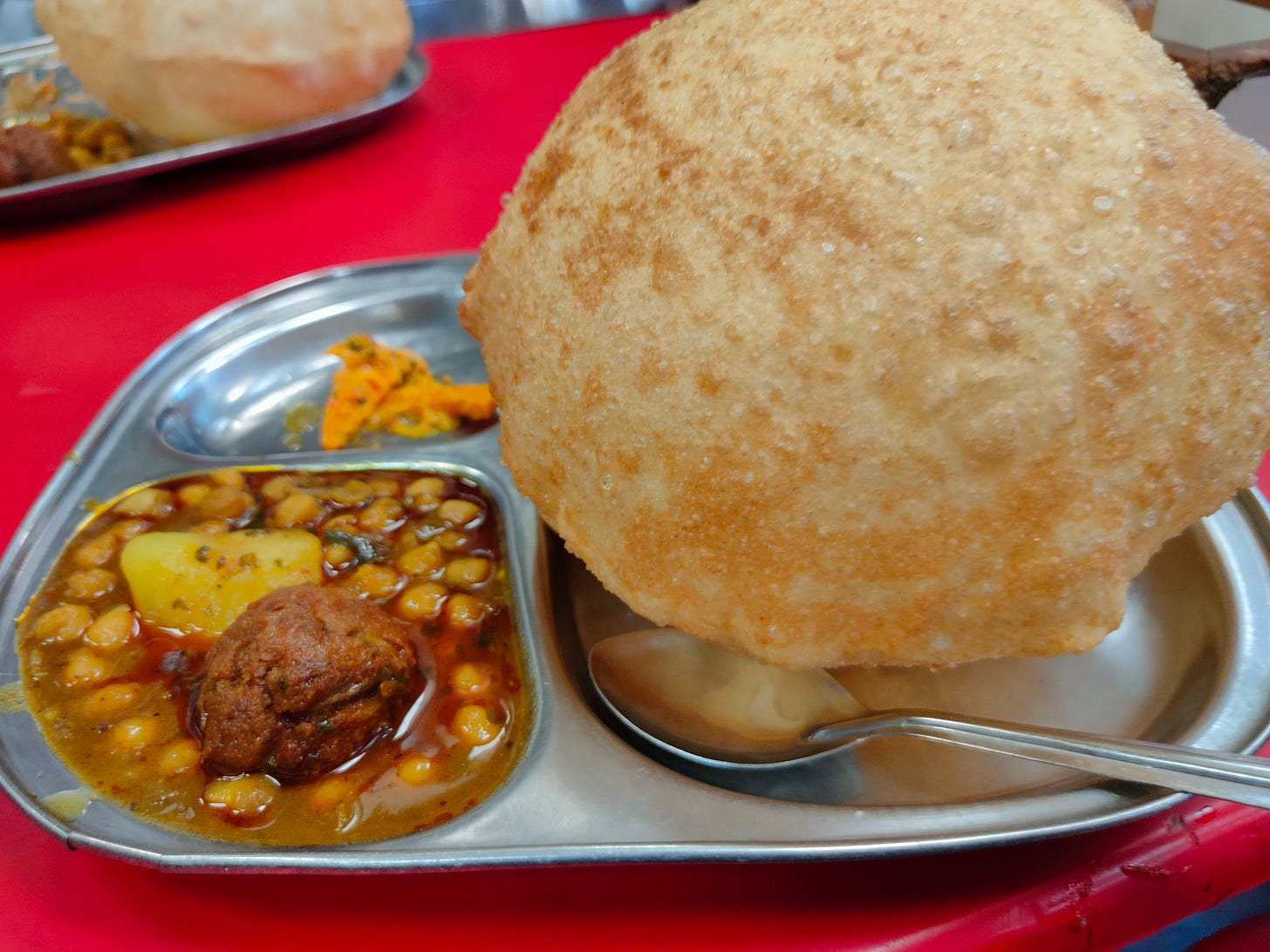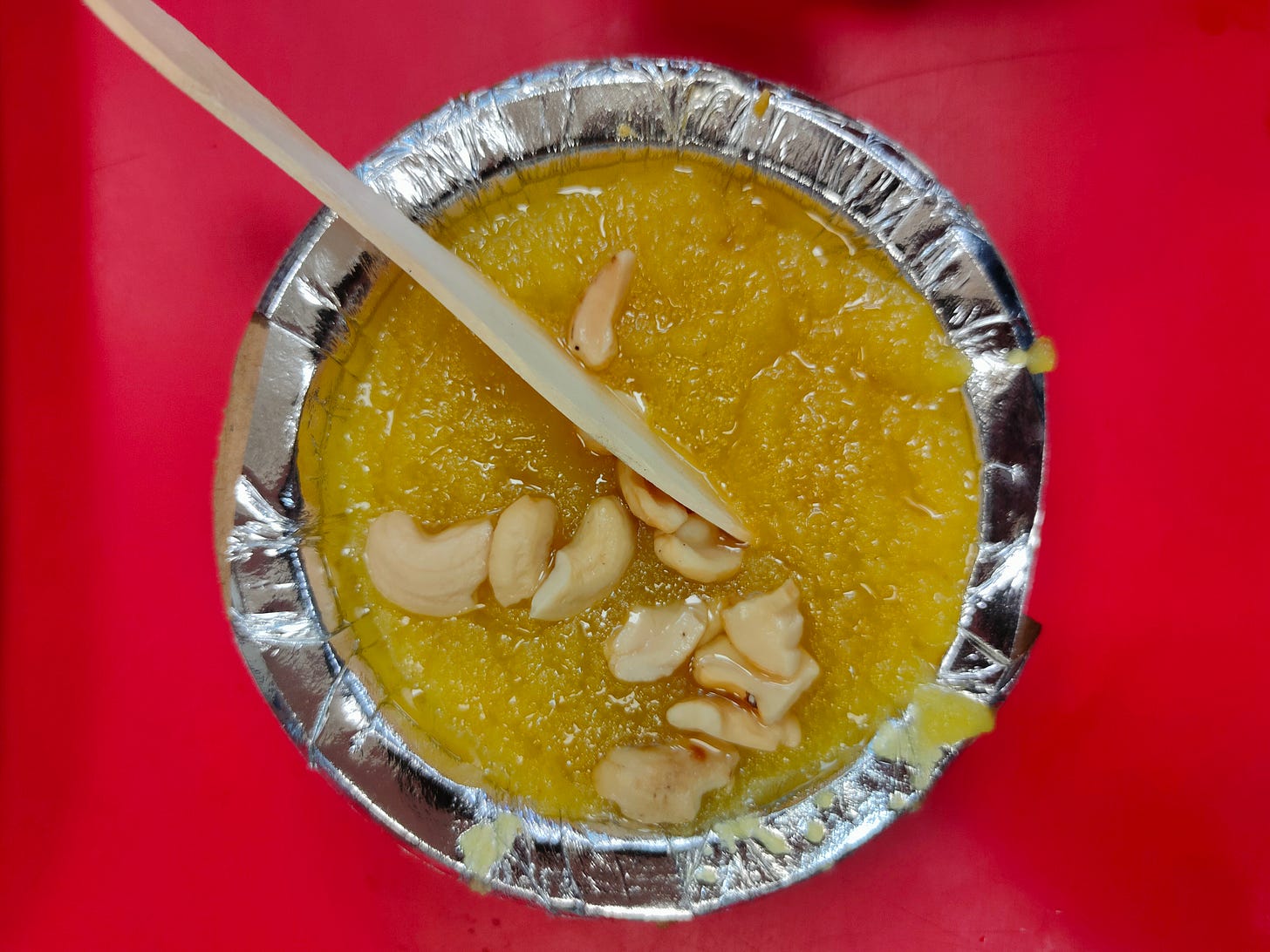A Scrumptious Snack to Start your Sunday : Bedmi Poori & Halwa from Standard Sweets in Gali Hakim Baqa
The day of publishing this is on a Saturday, but its a humble recommendation for your Sunday breakfast tomorrow.
Dilli has become eponymous with Chhole Bhatuure, and the breakfast has gained a strong following amongst the vast majority of its residents. The cultural impact of this relationship is quite strong. Local sports franchises use it in their promotional material. Instagram Influencers romanticise it to appeal to the average Dilliwalla’s emotions. Having Chhole Bhatuure for breakfast is a ritual that lakhs of these Dilliwallahs undertake every week, and every devotee of the Cult of Chhole has their own pilgrimage spot - their favourite Chhole Bhatuure spot - which they will defend till they go to the grave. Any criticism of Chhole Bhatuure becomes a direct assault on Dilliwallas, who will not respond to your displeasure very kindly, as I have come to learn over the months on my Twitter account. What I find interesting about this reality is that Chhole Bhatuure, in fact, is not the most “traditional” breakfast that Dilli has to offer. Most Chhole Bhatuure spots emerged in the city during or after the partition - Banshi Di Hatti in Malka Ganj opened in 1954, Sita Ram Diwan Chand in Paharganj opened in 1950, and Bhogal Chhole Bhatuure in Connaught Place opened in 1967, just to give some examples, as this was when Punjabis migrated to Dilli in great numbers, and began to outnumber the populations of Shahjahanabad and other residential areas, bringing with them recipes such as Butter Chicken and, well, Chhole Bhatuure, that would soon take over the culinary landscapes of Dilli.
But what if I tell you there is an iconic Dilli breakfast that predates Chhole Bhatuure, and has been savoured by Dilliwallas for more than a century now? I’m talking about Bedmi Pooris made with Urad Dal to differentiate it from a regular Poori, had with a helping of Aloo Sabzi, served with Halwa - made of Semolina and Ghee. While this dish’s origins lay outside Dilli as well, with many claiming that it originated in Uttar Pradesh, where it continues to be a staple, and it not being “traditional” in an original sense, just like most of the foods that Dilli has adopted as its own, such as Butter Chicken or Momos, I have described it as more “traditional” than Chhole Bhatuure owing to it being enjoyed in Dilli for far longer than the other (Of course, this may be a controversial way to describe it, one that I myself don’t necessarily agree with, and hence, the use of quotation marks, it just sounds good to your ears). A mere look at the establishment dates of the various Bedmi Poori stalls across Old Dilli confirms this - Shyam Sweets was established in 1910 and Shiv Mishthan Bhandar in 1936.
The subject of today’s story though, popped up much later. Standard Sweets is a standard, run-of-the-mill breakfast join located in Gali Hakim Baqa near Hauz Qazi Chowk, less than 200 metres from the Chawri Bazaar Metro Station on the Yellow Line of the Delhi Metro. This was established by partition migrants from Lyallpur (now known as Faisalabad), and hence, popped up much later than most stores in Old Dilli - having set up shop in 1956. But once you order a plate of Halwa-Poori served in the morning, you’ll realise that is not the only unique thing about this haunt. They are, in my experience (I’m happy to be corrected), the only stall in Old Dilli that serves Kofta with their Aloo-Poori, which makes Standard Sweets’ fare quite atypical.
A plate of Aloo-Poori gets you a humongous Bedmi Poori, a pickle, and a sabzi made of Aloo-Chhole-Kofta, which I would recommend you to pair with a side of their wonderful Halwa. Their Pooris are wonderfully fluffy, as pictured, and light on the stomach, which is great because it does not weigh down on you much and allows the Sabzi to shine through. Speaking of the Sabzi served at Standard, it is both unorthodox, owing to the Kofta (which, if I’m honest, I’m not much of a fan of, I just like the Aloo-Chhole on its own), and exceptional, a result of the wonderfully cooked Aloo and Chhole, which are flavoured with time-honoured spices that give it a rustic flavour.
What is the star of the show, however, is their Halwa. I am not exaggerating when I say that this may be the best Halwa I have had in my entire life. Its beauty lies in its simplicity, made of semolina and ghee of the highest echelon of ingredients, the ghee in particular standing out. Their halwa is akin to a tropical archipelago - coral reefs worth of semolina virtually swim in oceans of the ghee, with islands of cashew nuts littered throughout the sea. The ghee’s taste is neither overpowering, nor underwhelming. Its quantity is perfection - the correct amount to ensure it supplements the sweetness of the semolina and cashews, a bite of the halwa not needing one to chew it, as it melts in the mouth almost instantly, leaving behind a scrumdiddyumptious flavour and a mouthful of ghee, before reality hits you and you realise that, in fact, you have to chew on the cashews that have been left behind xD.
There may be no “traditional” breakfast of Dilli in the truest sense of the word. Every concoction that you may stumble upon has its origins in a foreign land - whether it be the Punjabi Chhole Bhatuure, the Awadhi Nihaari, or the UP-origin Nagori Halwa and Aloo-Poori. But that is what makes Dilli so beautiful to me. It is a wonderful melting pot of various cuisines, brought to the city by migrants who arrived here in varying socio-political times and contexts. But whatever your thoughts on Chhole Bhatuure are, and no matter what breakfast of the city you prefer to have, one thing unites the diverse cultural groups of Dilli - a common love for an indulgence in a heavy Sunday breakfast.
Recommendations : Aloo-Chhole-Kofta-Bedmi Poori (8.75/10), Halwa (9.5/10)
Location : 3510, Hakim Baka Street, Bazar Sirkiwalan, Khush Dil, Old Delhi, Delhi, 110006, Delhi 6



